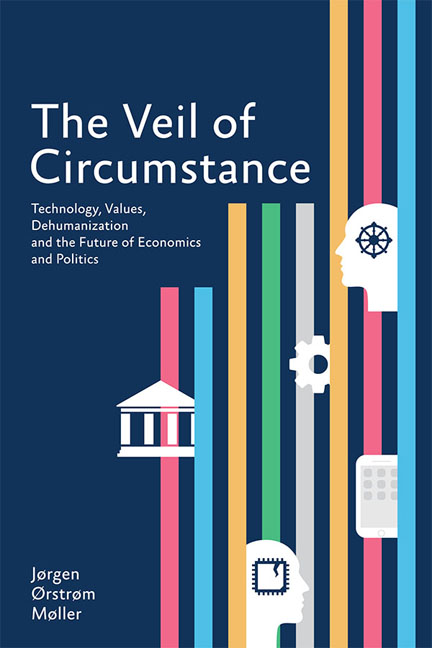 The Veil of Circumstance
The Veil of Circumstance 10 - Interdisciplinary – Complexity
from III - ECONOMICS
Published online by Cambridge University Press: 19 May 2017
Summary
As an intellectual tool, economics is no longer sufficient to analyse events and offer solutions to problems, due to the field's neglect of the realities of basic human behaviour. Incorporating interdisciplinary and inter-sectoral analyses has become imperative. The next step is to introduce the element of complexity to the study, as events continuously interact with other events, changing the picture incessantly. A way forward might be to replace deduction (from theory to the specific case) with induction (from specifics to a broader theoretical understanding). One suitable instrument to illuminate the nature and effects of these interactions, irrespective of scientific disciplines, could be big data. These three — complexity, big data and induction — might offer us a range of various outcomes to choose from, instead of the single-answer approach.
Economic theory has never really managed to incorporate Kenneth Arrow's (1974) basic observation that “Virtually every commercial transaction has within itself an element of trust, certainly any transaction conducted over a period of time.”
Admittedly, concepts such as social capital and social coherence have been the object of analysis for a number of years, but economists do not really take into account the massive importance of such factors.
If a society or community manages to establish common values, the cost savings are enormous. If, based on common values, people come to basically trust each other's motives, then the financial system will serve as an intermediary between savings and investment, the judicial system will translate into rules what the population already feels it is right to do anyway.
Alternatively, if a society is deficient in social capital, people do not trust each other, the financial system does not receive savings, which are instead hoarded in the form of gold or cash, there are few links between savings and investment, the judicial system's common rules will be interpreted differently by different social groups, leading to a cumbersome system that gobbles up resources and needs a large and expensive system to ensure compliance.
Without common values there is no trust among people. Trust means that people accept that decisions of vital importance to them can be made by other people.
- Type
- Chapter
- Information
- The Veil of CircumstanceTechnology, Values, Dehumanization and the Future of Economics and Politics, pp. 230 - 242Publisher: ISEAS–Yusof Ishak InstitutePrint publication year: 2016
